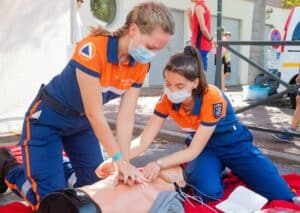Paramedic school is a big leap—a chance to turn a calling into a career where you’re the one making a difference when it matters most. It’s exciting, sure, but it’s also intense, demanding, and not for the faint of heart.
Getting ready isn’t just about showing up on day one with a backpack and a smile; it’s about setting yourself up to thrive through the grind of classes, skills labs, and clinicals. Whether you’re fresh out of high school or switching paths later in life, a little prep goes a long way. Here’s how to get your ducks in a row and hit the ground running.

Finding the Right Fit
First things first: figuring out how to become a paramedic starts with picking the right program for you. Not all paramedic schools are created equal—some are fast-paced, and others stretch out over a couple of years at a community college. Think about what fits your life. Are you juggling a job or family? A part-time option might be your speed. If you’re all in and ready to dive deep, a full-time role could get you there quicker.
Check out the atmosphere as well—visit if you can, talk to grads, or poke around online to see what clicks. You’ll need an EMT certification under your belt first, so if you haven’t done that, now’s the time. Finding the right fit isn’t just logistics; it’s about feeling like you’re in the right place to grow.
Brushing Up on the Basics
Before you step into the classroom, it’s essential to refresh your foundational knowledge. Paramedic school builds on EMT skills—think CPR, basic anatomy, and patient assessment—so get comfortable with those again. Crack open an old textbook or watch some refresher videos online.
You don’t need to be a genius at biology, but knowing your way around the human body—where the heart sits, and how the lungs work—gives you a leg up. It’s less about cramming and more about easing into the mindset, so when the instructor starts tossing terms like “hypoxia” your way, you’re not totally lost.
Getting Your Head in the Game
This isn’t your typical school job—paramedic training demands mental resilience. You’ll face long days, tough scenarios, and a pace that doesn’t let up. Start building that grit now. Practice staying calm under pressure—maybe run through mock emergencies with a friend or just get used to thinking quick on your feet.
Sleep and stress management are also important aspects to consider. Figure out what keeps you steady—whether it’s a solid night’s rest or a quick jog to clear your head—because burnout’s real, and you’ll want to dodge it before it even starts.
Sharpening Practical Skills
Paramedic school is hands-on, so get a head start on the physical side. Practice lifting heavy stuff safely—think stretchers or gear—since you’ll be hauling things around later. If you’ve got access to basic medical tools like a blood pressure cuff, play around with it. Even bandaging a buddy’s fake wound can build muscle memory. The goal’s not perfection; it’s familiarity. When you hit the skills lab, you’ll feel less like a newbie and more like someone who’s already got the hang of the basics.
Unlocking Your Learning Potential
How you learn matters, and paramedic school’s a chance to figure that out. Some people soak up lectures like sponges; others need to scribble notes or sketch diagrams to stick them in their brains.
Start unlocking your learning potential now—try different tricks like flashcards for med terms or quizzing yourself on the ride to work. It’s not just about memorizing; it’s about finding what clicks for you. Down the line, when you’re juggling pharmacology and trauma protocols, that self-awareness will keep you from drowning in the details.
Building a Support Crew
You won’t get through this alone, and that’s okay. Line up your people—family, friends, maybe a mentor—who can cheer you on or bring you coffee when the late nights hit. If you know current paramedics or EMTs, pick their brains about what worked for them. A study buddy’s gold, too—someone to bounce ideas off or run through scenarios with. Having a crew doesn’t just lighten the load; it keeps you grounded when the going gets tough.
Prepping Your Life Logistics
School takes up a lot of time, so handle the practical details early. Map out your schedule—classes, clinical rotations, study blocks—and see where life fits in. Bills won’t wait, so if you’re working, talk to your boss about flexible hours or stash some savings to lean on. Get your gear ready, too: comfy shoes, a sturdy bag, maybe a laptop if notes are your thing. It may be dull, but getting it done now saves you trouble later when you’re deep into training.
Stepping In With Confidence
When day one rolls around, walk in ready—not just with your books, but with the attitude that you’ve got this. Prep isn’t about knowing it all; it’s about being set to learn, adapt, and push through. Paramedic school is a wild ride, but with the right groundwork, you’ll come out the other side not just surviving, but crushing it. This is your shot to turn grit into skill—start strong, and the rest will follow.



